|
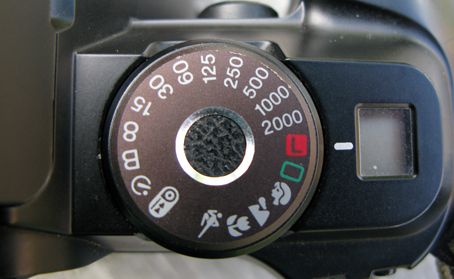
|
larspalm.com © • Lars Palm
Foto | |
 |
|
Canon EOS 10
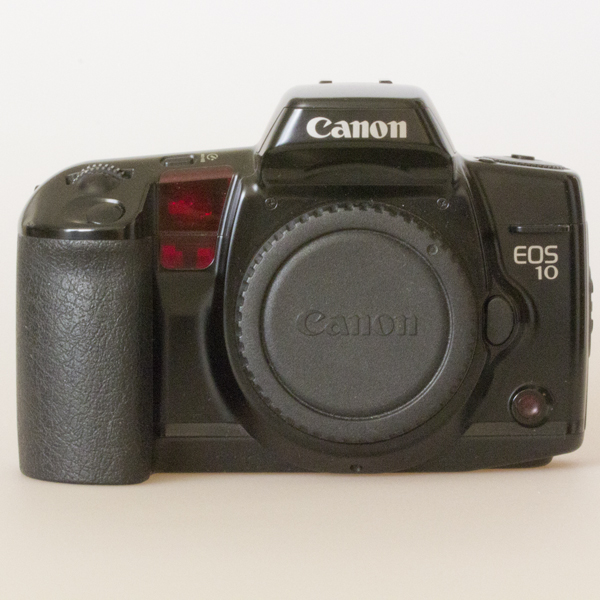
|
|
Marketed: March 1990
This camera introduced the newly-developed, Multi-BASIS AF sensor which provided three autofocusing points.
One-Shot AF and predictive AI Servo AF are featured as AF modes. In the Full Auto mode, the camera detects whether the subject is still or moving with signals received from the Multi-BASIS. The AF mode is then set automatically.
The three focusing points are red LEDs in the viewfinder's image area. They are easy to see and any focusing point can be selected manually with a button and dial. A bar-code book was also provided to enter the bar-code for camera settings needed to achieve the effects shown in the book's sample photos.
# 1256743
|
|
Canon EOS 100
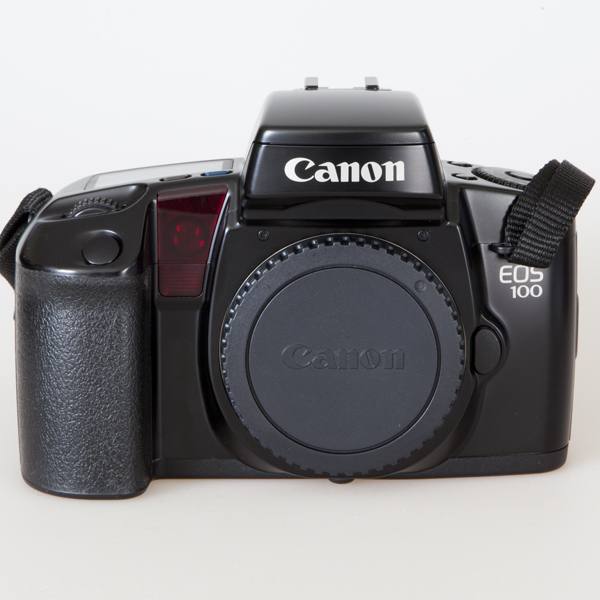
|
|
Marketed: August 1991
This was the world's first AF SLR camera which incorporated the concept of silent operation.
The newly-developed silent mechanisms reduced film advance noise and rewind noise by one-eighth to one-half the level of previous models. The built-in flash's coverage adjusts automatically (auto zoom) to suit the lens focal length. Red-eye reduction, second-curtain sync, and flash exposure compensation were other flash features. The Quick Control Dial on the camera back also enables real-time exposure compensation adjustment while you looked through the viewfinder. It was a feature-laden, mid-class multi-mode 35mm AF SLR.
# 1449640
|
|
|
|
Canon EOS 300 date &
Canon EOS 300
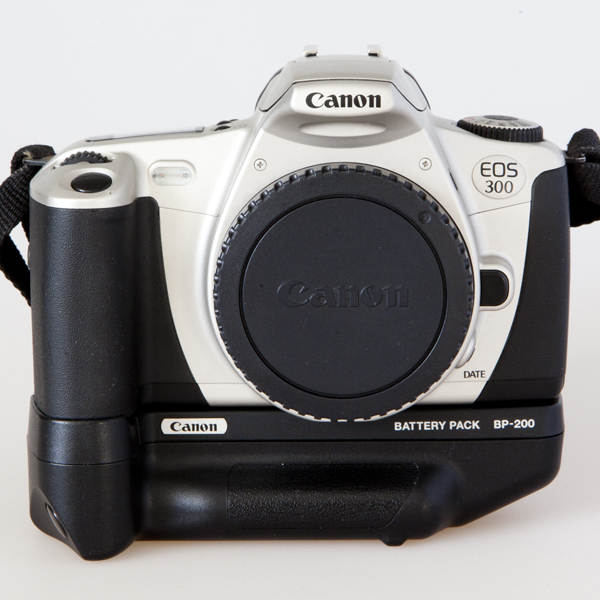
Bild: EOS 300 DATE & Battery pack BP-200
|
|
Marketed: April 1999
Ultra-Compact, lightweight and high-quality SLR camera. Successor to New EOS Kiss/REBEL G/500N. Based on the concept of "easier to use and more comfortable" than the former model, it is smaller and lighter weight. It also has a higher performance AF system, exposure control and other basic features. A seven focusing-point wide-view AF system is used instead of the conventional three focusing-point AF. The focusing speed is equivalent to that of the EOS 55/ELAN II E/50E. This camera has 35-zone evaluative metering instead of the conventional 6-zone metering, E-TTL flash exposure control linked to an active focusing point, and other basic features, such as easy depth of field preview , higher speed of 1.5 fps film advance, shorter viewfinder black-out time, mid-roll film rewind button and a wireless remote control (Japanese model only). The camera is compact, but the command dial, the main dial, an external LCD display, and a small, yet comfortable grip ensure a good handling of the camera. The camera body is two-tone silver and black. The Battery Pack PB-200 for size-AA batteries with a vertical-grip shutter button is separately available (4,500 yen). New lenses marketed at the same time are: EF28-80mm f/3.5- 5.6 V USM, EF28-80mm f/3.5-5.6 II (export only), EF75-300mm f/4-5.6 III USM and EF75-300mm f/4-5.6 III (export only).
The black model was introduced in Japanese market in September, 2000.
Date # 5152817
300 # 3943120
Faktablad 300 Date
|
|
Canon EOS 500
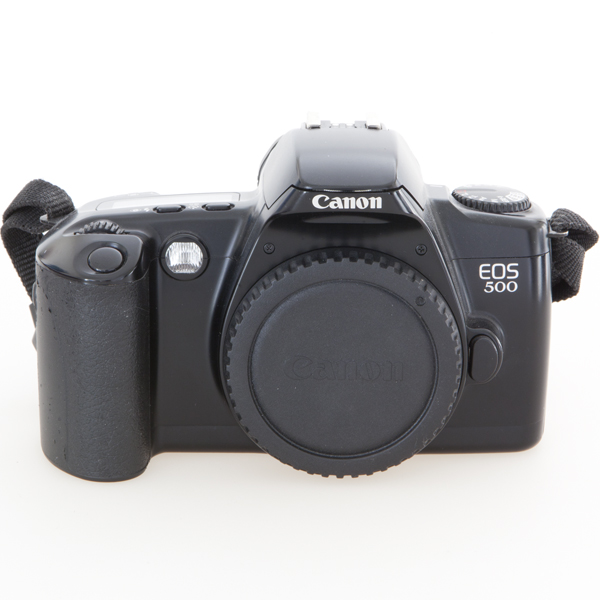
|
|
Marketed: September 1993
The eye-level viewfinder uses a roof mirror, making this camera the world's smallest and lightest 35mm AF SLR when it was launched.
The built-in flash is controlled with TTL autoflash metering. Other features include One-Shot AF, AI Servo AF, shutter speed-priority AE, aperture-priority AE, four Programmed Image Control modes, and metered manual. The world's smallest AF SLR body is thus packed with features.
With the prewind system, the entire roll is first wound onto the take-up spool. Then each time a picture is taken, the exposed frame rewinds into the cartridge. With its easy operation and friendly name of "Kiss," the camera became a major hit among young mothers and family snapshooters. It maintained top market share for an extended period.
# 8673454
Faktablad
|
|
Canon EOS 1000
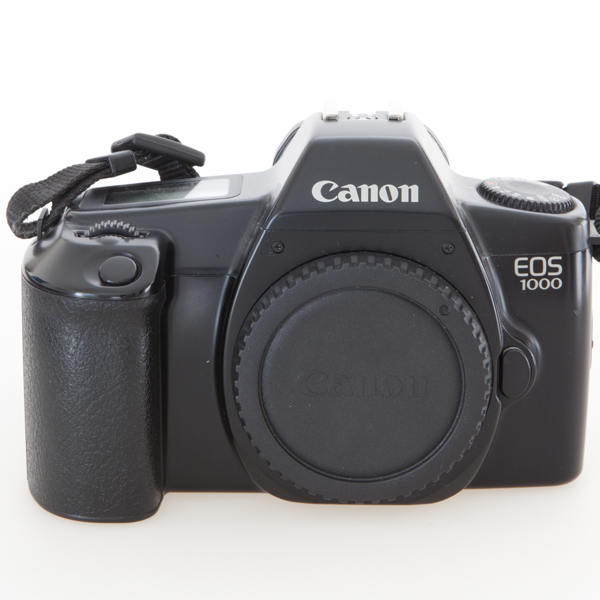
|
|
Marketed: 1990
Introduced in 1990 and the first of the new low-cost line. This was the worldwide namn, used everywhere except North America and Japan. No built-in flash.
Source: PhtotoNotes.org
# 2606271
|
|
Canon EOS 1000F
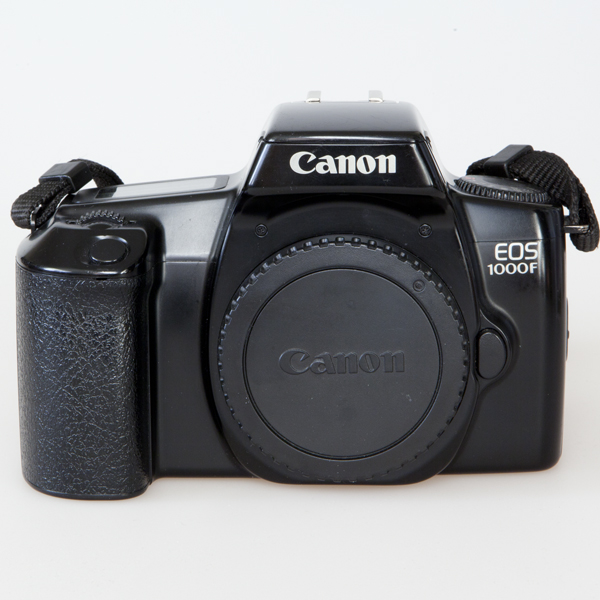
|
|
Marketed: October 1990
Compact and light (500 g with battery). The camera features One-Shot AF and predictive AI Servo AF, shutter speed-priority AE (TTL), aperture-priority AE (TTL), Intelligent program AE, depth-of-field AE, and metered manual. The prewind system is used. The built-in, manual-retractable flash uses off-the-film TTL autoflash metering with Guide No. 12 (at ISO 100 in m). Small, compact, affordable, and feature-laden, the camera was a hit product.
# 3448326
|
|
Canon EOS 1000F N
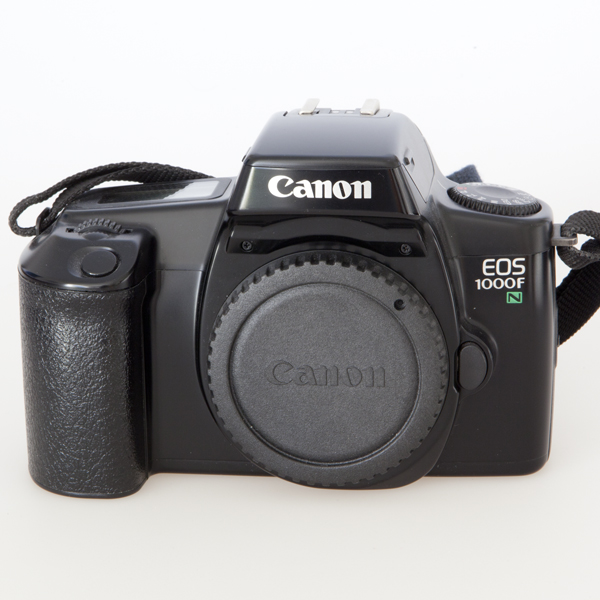
|
|
Marketed: March 1992
This is an EOS 1000 QD with silent film advance and rewind. The improved AF mechanism and microcomputer made the AF speed 1.5 times faster than the EOS 1000 QD.
# 4746140
Faktablad
|
|
Canon EOS 5000
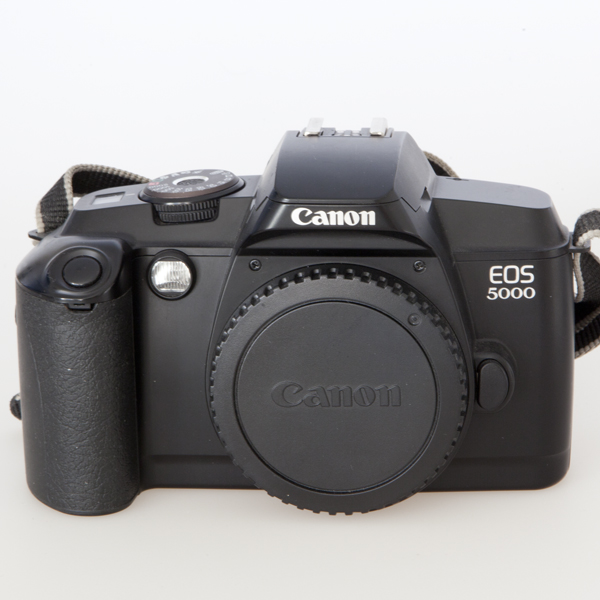
|
|
Marketed: January 1995
Fully automatic AF SLR for the European market. Features include compact design, silent operation, three focusing points, wide focusing area, center-priority focusing, 6-zone evaluative metering linked to the focusing points, 3-zone flash metering linked to the focusing points, metering and exposure-control modes, external LCD panel, viewfinder information, a large mode selection and shutter speed dial, and flash exposure control with a series circuit. In Asia (except Japan), the camera was marketed as the EOS 888.
# 8108418
Faktablad
|
|
Canon EOS IX
|
|

|
|
Marketed: October 1996
This is an IX 240 SLR camera in the EOS line, making it compatible with EF lenses. It also features Eye Control which enables you to select the desired focusing point with your eye. A Multi-BASIS AF sensor (|+|) is used. The focusing point can also be selected manually. The exterior features a stainless steel alloy finish and the body is shaped as a circle around the lens mount for a futuristic look. Drop-in film loading, magnetic recording of all IX information, and midroll change make the camera a top-notch IX 240 camera. The EF 24-85mm f/3.5-4.5 USM MS lens marketed at the same time matches the color of the camera body.
# 9301443
| |